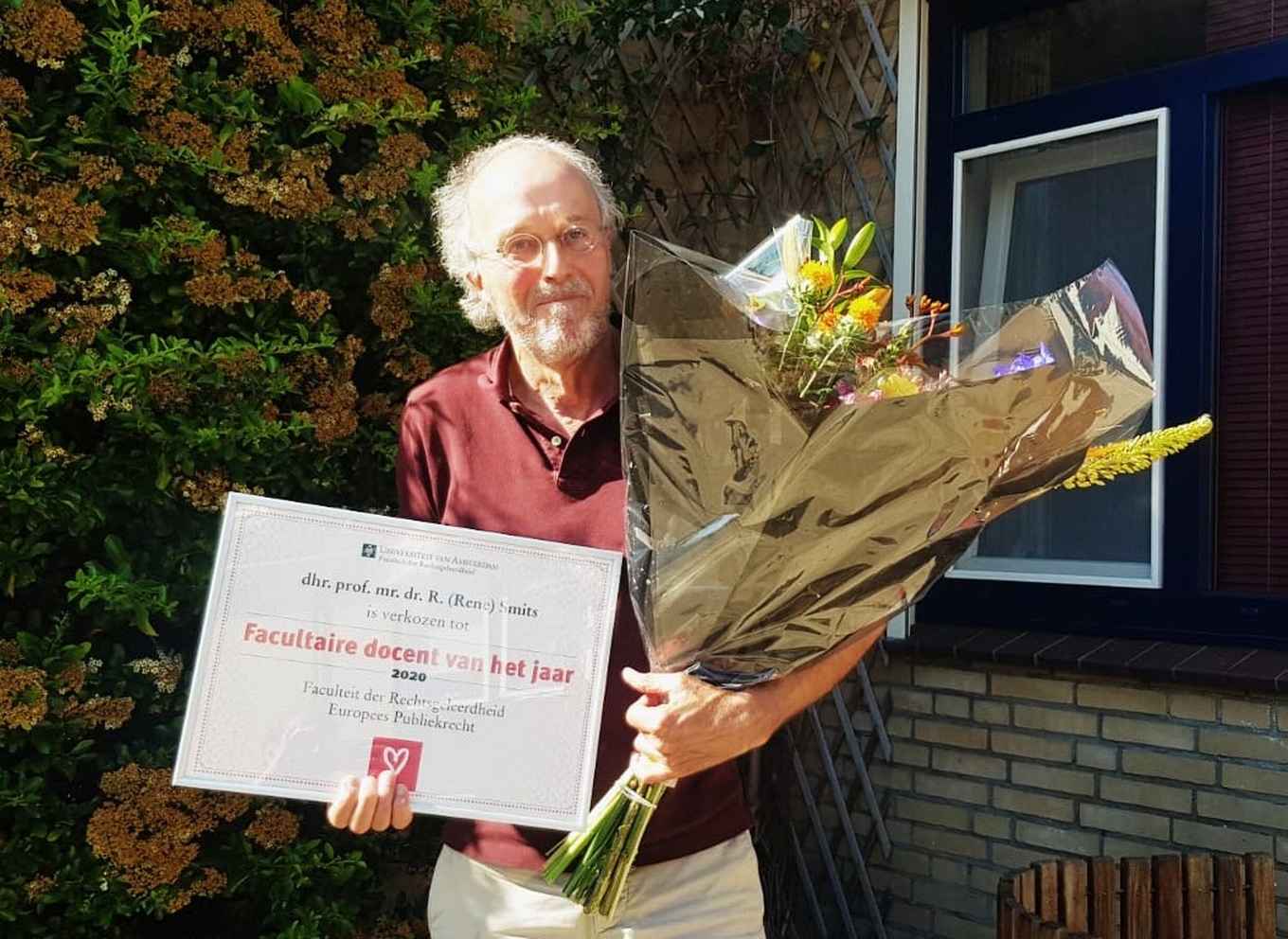René Smits is Lecturer of the Year
Amsterdam Law School
2 June 2020

He had to make do with an online Zoom applause, but that couldn't spoil the fun for René Smits, Professor of the Law of the Economic and Monetary Union. He is 'deeply impressed' by his appointment as Amsterdam Law School Teacher of the Year. After the announcement, the faculty delivered flowers to his home, and he immediately shared this moment with his students on Canvas. It is typical for Smits, who finds the contact with students the most beautiful thing about teaching. ‘I always learn from their questions.’
Congratulations on the appointment as Lecturer of the Year!
'Thank you, I'm still a little perplexed. I knew I was one of the nominees, but I had to share that honour with almost five hundred others at the entire UvA. I think it's a very nice recognition. Three years ago, due to the faculty reorganization, the elective course Law of Economic and Monetary Union was deleted from the study program as it drew an insufficient number of students. Since then, I have been teaching the course Institutional Aspects of EU Financial and Monetary Law and Regulation at the master Law & Finance. It’s great that this ‘relaunch’ is now being rewarded with this award.’
Students call your lectures very instructive.
‘I start lectures and tutorials with silence. When the lecture hall has finally become quiet, I extend that stillness before I begin to speak: in such an awkward minute we can all let go of mental turmoil and ‘arrive’. I advise students to focus on what they want to bring out of our meeting and what they want to contribute to it. I find it important and instructive to involve current affairs in the lectures. I am closely involved myself as a (deputy) member of a review panel for the supervisory decisions of the European Central Bank. Sometimes there are very exciting developments, such as the German criticism of the ECB's buy-back programme in a court ruling that snubbed the European Court of Justice. I find this up-to-date knowledge, and my views on it, important for students: it can inspire them and it enables them to understand how I shape my thoughts.'
'He tells a lot from his own experience. Even now, he keeps in touch about the ECB and corona, for example'Student
You're also called very creative...
'Yes, being playful with the form also helps: a crazy thought popped up this year when I said that the short presentations on judgments from the European Court that students are to give during tutorials could start with a poem. Whereupon nice rhyming summaries of the material promptly emerged at the beginning of the presentations.'
Can you motivate every student?
‘Law & Finance students have consciously chosen this master's, which already makes them intrinsically motivated. My students who opted for EMU law in the past did too. But there are always students with whom I feel a certain resistance, on the subject matter or on the assignments. I talk to these students, I listen to them. Then it may be necessary to explain a difficult concept differently or to investigate what is the source of the discomfort. Sometimes students find out that the subject doesn't quite fit their interests, it's good if that comes to the surface. I think it's my job as a teacher to make sure that the interaction with the students is good'
‘He's accommodating and understands imperfection’, according to a student.
‘I always invite students to ask questions and to rebut what I tell them. I always say: 'There are no stupid questions', just dare to ask any questions. When testing, the emphasis is on the ability to reason: what does the student think of a court decision or an applicable rule? Also, I always sketch a broader perspective: law is only one of the approaches to reality and in all interaction we strongly depend on the language we use: word usage and the connotation that terms evoke, especially in different languages, influence our view of the world. In any case, they make clear our implicit assumptions, awareness of which is called for. I think my study of sociology (which I did besides law) plays a part in this.’
'René Smits is a great teacher who cares a lot about his students'Student
In a few months, you're going to be emeritus. What are you going to miss the most?
‘Contact with students. I find the interaction with them very inspiring. Every time I learn from their questions and interests and their response. In these times of corona I have a completely different contact, but no less valuable. I try to guide students as well as possible from a distance and give them courage. Fortunately, I am not going to stop teaching altogether, I certainly want to continue to be involved in education in the master Law & Finance next year and I also want to remain active outside the Netherlands, for example at the University of Bologna. For me, this election feels like the best thing that can happen to a lecturer.'
About René Smits
René Smits has been a part-time law (0.1 fte) professor of the Economic and Monetary Union (EMU) at the Amsterdam Law School since 2000. He previously worked many years (1989-2001) at De Nederlandsche Bank N.V. (DNB, De Nederlandsche Bank) in Amsterdam (the Dutch central bank), the last twelve years as general counsel.
From 2001 to early 2014, he worked at the Netherlands Competition Authority (NMa), and its successor ACM (Authority Consumer & Market), in various positions.
In September 2013, René Smits was appointed assessor at the Competition College of the Belgian Competition Authority. In September 2014 the Governing Council of the ECB appointed him as a deputy member of the Administrative Board of Review (ABoR), an independent review panel for the ECB's supervisory decisions.